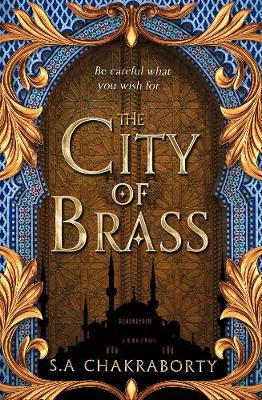Reviewed by sa090 on
It had a slower start than expected, but by the end of books like these you just recharge that wonderful drive to read that’s been missing for months.
───────────────────
I heard that the slow beginning had differing opinion here and there, and for me personally it was both a good thing and a somewhat bad thing. For instance, this awesome journey that Nahri takes with the Djinn warrior (Dara from henceforth) to reach Daevabad shows me different aspects of S.A. Chakraborty’s magical world, especially the creatures Nahri will be dealing with from now on. However, Dara doesn’t actually make it that informative of a journey. Of course, when things actually “appear” in front of them, he’ll explain what they are and show how dangerous they are if they were some very high level creatures. But, other than that, he’ll be so secretive about everything Nahri asks that it gets frustrating, even more so when some of the dialogue implies that him actually painting the edges of his world to her would do her no harm whatsoever.
To that end, I’m extremely grateful that I have more than enough of a background about these legends and setting that I don’t really need him to explain much to me, but given that it’s a fantasy world, “inspired” by Islamic/Middle Eastern mythology and legends, it’s not exactly a very appreciated withholding of information when the author could literally do anything and add anything that will be foreign to me at any moment. I mean, I do understand the reason an author would do this, but the way it was done in the instances here made it seem like I won’t tell you because of “reasons”, not because you don’t need that information at the moment. Nahri proves to be clever at times and forces him to talk, which I loved by the way, but that doesn’t really change much from my initial impressions.
The world she created is really extremely rich and beautiful to see with many tribes of Djinn to discover and see more of. Lack of proper information aside, she thankfully adds many instances where you can see and learn more about these tribes in either the political side of things, the different characteristics or how important they really are. Especially since the story is told from two point of views, the first being Nahri and the second being one of Daevabad’s residents (Ali from here on out) who could access and showcase many sides of this magical and dangerous city. That’s not where she stops though, S.A Chakraborty includes many issues in this book (racial discrimination, rape, genocide, trafficking...) and she sticks to the diversity needed in a setting like this. However, given my own knowledge of the background, I do think that she may have not shown the cultural aspect of Islam all that well in some areas, but it might be just me.
Talking about the plot would just spoil it, but I assure you that it’s worth the journey. The characters in the other hand are easier to talk about, Nahri is by far the best character in this book for me because of her development and how she handled things whenever she could. Even when she was told to let go of it and basically wait for information to be spoon fed to her when needed, she’ll try in different ways to get what she wants. Still a flawed character for sure, but to me personally I enjoyed watching her grow compared to how she started. Our Djinn warrior on the hand was the worst one for me, his lack of information aside, his general attitude just makes him this very unlikable individual to follow with how angry he is and how he seemingly expects that it will be okay to give everyone a hard time because of it. Even till the every end, to me he remains the same, I didn’t sense any change in him at all despite the initial illusions of change which were once again solidified by the ending. I do get where he was coming from, but his attitude or rather his way of going about things just freakin ruins every single good thing about him.
Ali was better in that regard, of course he also had moments that mirrored Dara’s in his rage and such but attitude wise, he was a much better built character to me than Dara. Also, he was a much better source of information so that’s a huge plus no matter how I look at it. The romance in this book was one thing I didn’t really like all that much, for the sake of how incredibly rushed and out of place it felt compared to almost everything else happening here... this makes me super excited for the sequel though, would love to see what happens now.
Despite the initial slowness of the book, the book picks up once all the characters are assembled in the same location. Especially the last quarter of the book, that just flew by with one of the most enjoyable action and magic displaying scenes I’ve read in 2018. The best thing about it though, is that epilogue that makes me want to pay anyone anything to get me the sequel that’s coming out in a few months.
Final rating: 4-5
Reading updates
- Started reading
- 9 August, 2018: Finished reading
- 9 August, 2018: Reviewed
